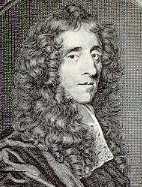 Ideas
Ideas
– There are no innate ideas.
– Human knowledge is derived either from sense experience or from introspection (reflection).
– Ideas are signs that represent physical and mental things.
– Things ahave primary qualities (solidity, extension, figure, motion or rest, and number) and secondary qualities (all others, including color, sounds, smells, flavors, and so forth).
– Bodies actually possess the primary qualities, but the secondary qualities are merely the effects observed by those qho perceieve them.
– Good is whatever produces pleasure, and evil whatever produces pain.
– Liberty is for the sake of pursuing happiness.
– The state of nature, prior to the existence of human government, is subject to the rule of natural or divine laws, which are revealed through the exercise of reason.
– The chief reason for establishing governments is the preservation of private property.
– Civil government comes about as a result of a social contract.
Biography
Prominent empiricist philosopher, natural law social thinker and Whig political theorist, John Locke was nonetheless a rather traditional Mercantilist in his economics. It was Child’s promotion of low interest that prompted Locke to turn his attention to money and developing a theory of money in his 1692 Considerations. Locke introduced concept of ‘money as convention’ as well as, following Jean Bodin, the main elements of the quantity theory of money, notably the concept of ‘velocity’.
Locke saw that the lowering of interest by legal means might very well lead to a collapse in trade because it would not reflect the ‘natural scarcity’ of money. If money collapsed, then there would be, alternatively, a collapse in output or prices. The collapse in prices would lead to relatively cheap English goods and relatively expensive foreign ones ‘both which will keep us poor’ (Locke, 1692). Unlike Mun, Locke did not see this as a promoter of exports.
Locke’s ideas on value are a bit obtuse and inconsistent. In his 1690 Treatises, he proposes a quite explicit labor theory of value. In his 1692 Consequences, Locke adheres to a demand-based theory of value. John Law (1705) did much to clarify the confusion between them.
Finally, Locke also proposed a theory of property in his 1690 Treatises. The right to property, Locke claims, is derived from the labor of those who work it. More specifically, he perceives that as ‘labor’ is naturally ‘owned’ by the person in whom it is embodied, then consequently anything that labor is applied to, is similarly ‘owned’ by the laborer – a rather proto-Marxian notion.
Locke’s ‘natural labor theory of property’ stands in stark contrast to that of Thomas Hobbes, who conceived of property merely as a state guarantee, and of Hugo Grotius, who contended that property emerges from social consent.
Major Works of John Locke
– Fundamental Constitution for the Government of Carolina (1669)
– First Letter on Toleration (1689)
– Second and Third Letters on Toleration (1690-1692)
– Treatise on Civil Government (1690)
– Concerning Civil Government: Second Essay (1690)
– Essay Concerning Human Understanding (1690)
– Consequences of the Lowering of Interest and Raising the Value of Money (1692)
– Further Considerations Concerning Raising the Value of Money (1695)
– Short Observations on a Printed Paper (1695)
– Reasonableness of Christianity (1695)

 Ideas
Ideas
Real clear website , thankyou for this post.